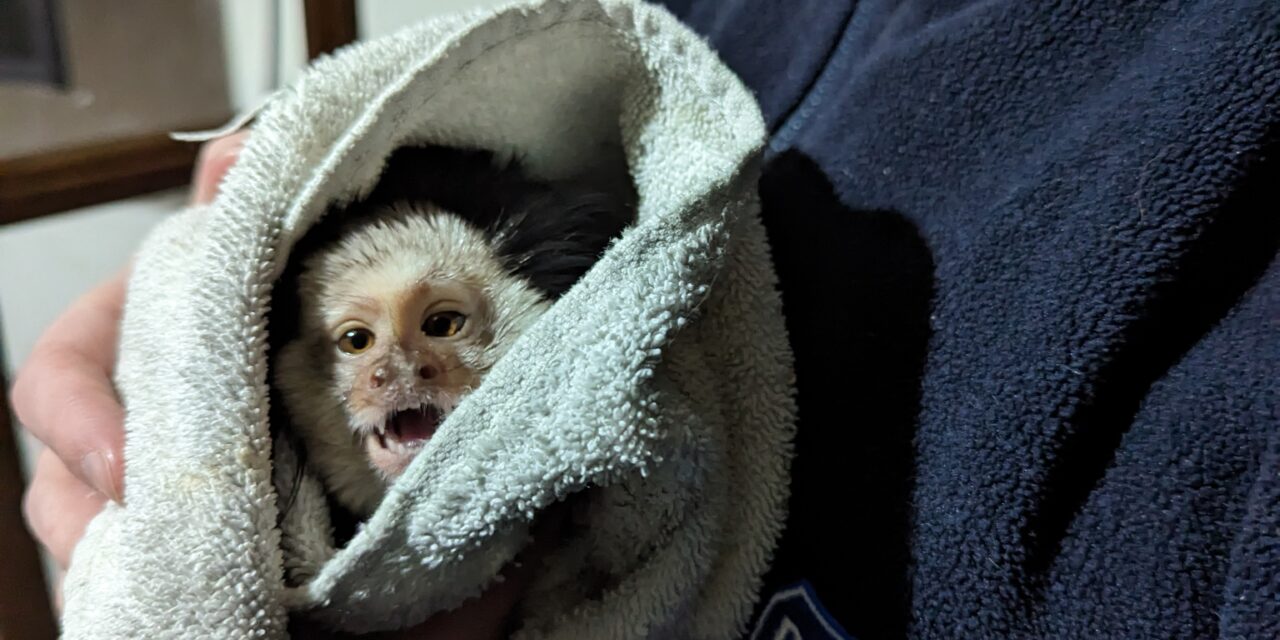Precious was found screaming, rolling and was unable to walk
A Rhondda Cynon Taf man and a woman have been banned from keeping animals for 10 years after they failed to care appropriately for a marmoset monkey they kept as a pet – leading her to suffer from severe metabolic bone disease.Tragically, the white-faced marmoset – commonly known as a Geoffroy’s marmoset monkey – named Precious, was put to sleep on veterinary advice to prevent further suffering. Sadly, her two owners had not researched how to care for a marmoset before purchasing her and had been feeding her the wrong diet and had not been meeting her needs.
Laura Pittman (dob 29/04/1971) and Jonathan Leighton Phillips (dob 07/08/1969) both of Brynhyfryd Terrace, Ferndale, appeared at Merthyr Tydfil Magistrates Court on 27 September and pleaded guilty to two offences under the Animal Welfare Act.
They admitted failing to provide adequate and appropriate care to Precious, leading to severe metabolic bone disease, and also admitted failing to ensure her needs were met in one or a combination of:
- Need for a suitable environment
- Need for a suitable diet
- Need to be maintained in an appropriate body condition
- Need to be housed with other animals
- Need to be able to express normal behaviour patterns
- Need to be protected from pain, suffering, injury and disease including but not limited to lack of treatment for her metabolic bone disease
They were sentenced last Thursday (2 November) at Merthyr Tydfil Magistrates Court and handed a 12 month community order with 10 days RAR. They were both fined £350, and ordered to pay a £140 victim surcharge. Phillips was also ordered to pay £966.71 costs and Pittman was ordered to pay £965.21 costs.
In mitigation it was heard that both defendants were remorseful for their actions and had been behind the RSPCA being contacted to start with. It was heard that they had co-operated throughout and they had been well intentioned but provided incompetent care.
The court heard a written statement from RSPCA deputy chief inspector Gemma Cooper, stating that the son of one of the defendants had called the charity alleging that the previous owner of the marmoset had died and was handed to them to care for. He told the RSPCA that they didn’t know how to look after her, and thought she needed emergency vet treatment.
It was on 1 April of this year when DCI Cooper attended the Ferndale property and saw Precious for the first time. She was told by the defendant’s son that the marmoset was around 18 months old.
She said: “He invited me into the living room of the house where the marmoset was confined in a small cat carrier and all of her belongings were packed in a bag.”
DCI Cooper said she was “shocked” by the confidence in which the man handled her given that he had only just acquired her.
“The marmoset was screaming and rolling around in a chaotic and unpredictable manner and unable to walk,” she said.
“He went through the bag of things for Precious, explaining that the primate pellets were what she should be eating but that she doesn’t like them so she has been eating mainly grapes and fruit.
“He said that he has heard the owner was feeding her raisins and so she probably has ricketts.”
Precious was then signed over to the RSPCA and taken to a vets where she was examined by veterinary staff and hospitalised for further treatment and investigation.
Through enquiries it was found that the defendant’s had been trying to sell to Geoffroy’s marmosets on 4 January 2023 through social media. The defendant’s then admitted ownership.
Sadly on 3 April the exotics specialist at the vets called to say he had examined Precious and due to the severity of her condition euthanasia was recommended.
In the written vet report, provided to the court, it was said that an initial examination revealed that Precious was having severe difficulties with mobility.
The vet said: “She was bearing weight on the palmar aspect of her right forelimb, but seemed unable to do so on the left, instead, she was bearing weight mostly on the underside of the elbow on that limb.
“Precious also appeared unable to bear weight and ambulate normally on her back legs, which seemed stiff. She was effectively dragging herself around on the towel. Precious was unable to climb, or leap and when she tried to move, she appeared severely uncomfortable. I took a video of Precious moving on a towel.”
Precious was anaesthetised for a closer examination and was reported to weigh 260g (9.2oz).
“The body condition score was poor, I would score it 2/5 on a scale where 1/5 is emaciated, 2/5 is thin, 3/5 is ideal, 4/5 is overweight and 5/5 is obese,” the vet added. “The spinous processes of the vertebrae and the tuber coxae of the pelvis were both markedly prominent.”
The radiographic findings were consistent with severe metabolic bone disease – which the vet explained as a disease which develops when an animal becomes deficient in calcium and/or vitamin D3 (which is needed for the body to be able to regulate and utilise calcium properly).
In response to other factors discussed by defendants in an interview with DCI Cooper, he said there were a “number of concerns”.
Although Precious had been present with another monkey named George when first bought, it was heard from the defendant’s that George was returned to the original owner about a week or two after they were acquired.
“This would suggest that Precious has been without companionship for a period of approximately a year,” added the vet.
Marmoset monkeys are highly social animals that naturally live in groups of up to 20 animals. They need to be kept with members of their own species so they can socialise and display behaviours like social grooming, food sharing, communal resting and interactive play.
It was also suggested in the interview that Precious was fed yoghurt, fresh and dried fruit and mealworms.
In his report, the vet, said: “Marmosets are omnivores and should be fed a varied diet consisting of live insects, fresh fruits and vegetables, gum arabic (as they naturally consume tree sap) and also a complete marmoset pelleted food.
“Live insects and vegetables are hugely important components of the diet and yoghurt should not form part of the diet. Livefood offered should include various insects, including crickets, locusts, cockroaches and occasional worms. Mealworms are not a particularly nutritious, as they have an inverse calcium: phosphorous ratio and especially when fed in dried form, such as those that came
with Previous when she was admitted.”
The vet added that he believed that Precious was not provided with a suitable diet.
He also said that he was concerned that Precious was not kept in a suitable environment with dimensions given by the owners as being approx 4 x 5 x 3 feet (1.2m x 1.5m x 0.9m). It was suggested that Precious was caged at night but otherwise was able to come and go as she pleased.
“This enclosure is far too small. Primates must be housed in a suitable enclosure, with enough space to leap, climb, swing and forage,” he said.
He was also concerned by suggestions that no vitamin supplements were given or UV light used which “both are essential steps for preventing metabolic bone disease in small new world primates housed indoors”.
In an interview with DCI Cooper it was also suggested that Precious was not taken to a vet for financial reasons.
In his conclusions the vet said he believed that “this animal was suffering from metabolic bone disease for a period of several weeks at least, but more likely for several months”.
He added: “I believe that this animal would have been exhibiting lameness and mobility issues
for a period of weeks prior to presentation and that it should have been presented to a suitably qualified and experienced vet for investigation at a much earlier time.”
Following sentencing DCI Cooper said: “This is a really sad story of a people buying an exotic animal on a whim and not knowing how to meet their needs.
“In their interview the defendants admitted they had not carried out any research before buying her and had been feeding her the wrong diet.”
RSPCA’s head of wildlife, Dr Ros Clubb, added: “This is a heartbreaking case and Precious will undoubtedly have suffered horribly. Sadly we fear there are many more marmosets like Precious suffering behind closed doors because people do not know how to look after these animals properly and, as well as causing suffering to the animals, the owners risk falling foul of the law. That is why we, and other charities, are so concerned about the situation and wish to see the keeping and trade of primates as pets come to an end.
“Because of the specific needs of these animals their level of suffering can be extreme. As well as dietary and environmental needs, primates are highly social animals and they have extremely complex behavioural and social needs – but sadly in many cases they are being kept alone. They are wild animals that do not belong in people’s homes.”




